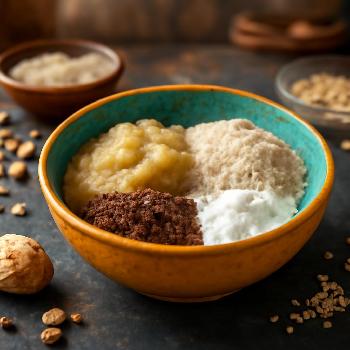Cooking Tips > Ingredients & Substitutes > Common Ingredients > What are the best substitutes for eggs in baking?
What are the best substitutes for eggs in baking?
Eggs play a crucial role in baking, providing structure, moisture, richness, and binding. However, for those with allergies, dietary restrictions, or simply running low, finding the right substitute is essential. This guide explores some of the best egg substitutes for various baking needs, helping you achieve delicious results without eggs.

Understanding the Role of Eggs in Baking
Before diving into substitutes, it's important to understand what eggs contribute to baked goods. They primarily act as binders, holding ingredients together; leaveners, adding air and lightness; and enrichers, providing moisture and flavor. The best substitute will depend on the specific function the egg is providing in the recipe. For example, if a recipe only calls for one egg and it's mainly there for binding, a simple substitute like applesauce will work perfectly. However, if the recipe relies on eggs for its structure and leavening, like in a meringue, finding a suitable replacement is more challenging.
Applesauce
Applesauce is a great substitute for eggs when moisture is needed, and the recipe isn't heavily reliant on the egg for structure. Use 1/4 cup of unsweetened applesauce to replace one egg. Using sweetened applesauce may affect the overall sweetness of your baked good, so adjust accordingly. Applesauce works particularly well in muffins, cakes, and brownies.
Mashed Banana
Similar to applesauce, mashed banana adds moisture and a slight sweetness. Use 1/2 of a mashed banana to replace one egg. Keep in mind that the banana flavor will be noticeable, so it's best used in recipes where that flavor complements the other ingredients, like banana bread, muffins, or chocolate cakes. It is not recommended for recipes where a neutral flavor is required.
Flaxseed Meal (Flax Egg)
Flaxseed meal mixed with water creates a binding agent that mimics the texture of an egg. To make a flax egg, mix 1 tablespoon of flaxseed meal with 3 tablespoons of water. Let it sit for 5-10 minutes until it thickens. This mixture can replace one egg and works well in cookies, muffins, and quick breads. Flaxseed also adds a nutty flavor and some nutritional value.
Chia Seeds (Chia Egg)
Chia seeds function similarly to flaxseed. To make a chia egg, mix 1 tablespoon of chia seeds with 3 tablespoons of water and let it sit for 5-10 minutes until it thickens. This mixture can replace one egg and is especially good in pancakes, waffles and cakes. It has little to no discernible taste.
Commercial Egg Replacers
Commercial egg replacers are formulated to mimic the various functions of eggs in baking. These often contain a blend of ingredients like potato starch, tapioca flour, and leavening agents. Follow the package instructions for using them, as they can vary depending on the brand. These replacers are a good option for recipes that require the binding and leavening properties of eggs.
Silken Tofu
Silken tofu can be blended until smooth and used as an egg substitute in cakes, muffins, and brownies. Use 1/4 cup of pureed silken tofu to replace one egg. Tofu adds moisture and a dense texture. It's best used in recipes where the tofu flavor can be masked by other strong flavors.
Yogurt or Buttermilk
Yogurt or buttermilk can add moisture and a slight tang to baked goods. Use 1/4 cup of plain yogurt or buttermilk to replace one egg. These substitutes work well in cakes, muffins, and pancakes, especially when combined with a leavening agent like baking soda.
Aquafaba
Aquafaba, the liquid from canned chickpeas, is an excellent substitute for egg whites, especially when whipped into meringues or used in macarons. The proteins and starches in aquafaba allow it to be whipped into stiff peaks, similar to egg whites. Use 3 tablespoons of aquafaba to replace one whole egg, or 2 tablespoons to replace one egg white. Always use unsalted aquafaba for best results.
Carbonated Water
For a light and airy texture, especially in cakes, use 1/4 cup of carbonated water to replace one egg. The bubbles in the water help to create a lighter crumb.
Important Considerations
When choosing an egg substitute, consider the following:
Experimenting with different substitutes is often necessary to find the best one for a particular recipe. Start with smaller substitutions and adjust as needed. Always check for doneness; eggless baked goods may cook faster or slower than those made with eggs.
FAQ
-
Can I use any egg substitute in any recipe?
No, the best substitute depends on the function the egg provides in the recipe. Consider whether the egg is primarily for binding, moisture, leavening, or flavor when selecting a substitute. -
Does using an egg substitute change the baking time?
Yes, it can. Eggless baked goods may cook faster or slower than those made with eggs. Keep a close eye on your baked goods and check for doneness using a toothpick. -
Will an egg substitute affect the taste of the baked good?
Yes, some substitutes, like mashed banana or applesauce, can impart their flavor to the final product. Choose substitutes with flavors that complement the other ingredients in the recipe. -
Is it possible to make meringues without eggs?
Yes! Aquafaba (the liquid from canned chickpeas) can be whipped into stiff peaks, similar to egg whites, and used to make meringues and other egg-white-based desserts. -
Where can I buy commercial egg replacers?
Commercial egg replacers are typically available in the baking aisle of most grocery stores or health food stores. They can also be purchased online.
